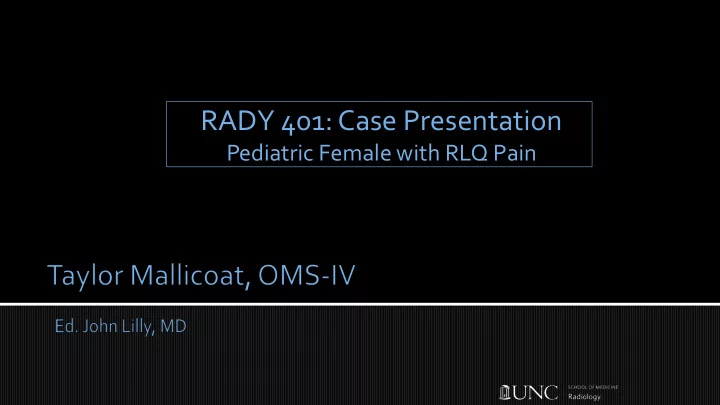

RADY 401: Case Presentation Pediatric Female with RLQ Pain
HPI PE & WORKUP 11 year old Hispanic female presents to PE was unremarkable PED with RLQ pain ▪ A&Ox3 – no acute distress Intermittent “squeezing” pain which ▪ Abdomen: nontender, non-distended, began one day prior – made worse with BSx4, no rebound tenderness, no movement guarding Non-bloody, non-bilious emesis began ▪ Obturator and Psoas sign – negative day of presentation No fever, hematuria, or dysuria – BM ß-HCG (-) every 3-4 days UA – WNL MHx unremarkable OBGYN consult
What studies are appropriate?
Initial Study – Transabdominal Pelvic US Subsequent Study – Abdominal/Pelvic CT with IV and oral contrast
Right ovary (pictured) - Right enlarged: measuring 5.0 x 2.6 x 5.2 cm (volume = 35mL) Left ovary (measurement not pictured) – normal: measuring 3.1 x 1.8 x 3 cm (volume = 9mL) Cystic masses evident bilaterally – consistent with follicles No abnormal pelvic fluid or focal masses evident Normal ovarian volume: 5 -15 mL.
Conventional Color Doppler Power Doppler Diminished arterial and venous flow demonstrated within the inferior right ovary, as demonstrated above.
Enlarged right ovary (see blue arrow)- measuring 5.9 x 2.2 cm – consistent with US. Distended bladder, but otherwise unremarkable (see red arrow). Remainder of CT was unremarkable. Appendix, kidneys, bowel – all WNL.
Yellow arrow is indicative of left ovary for comparison. Left ovary is measured at 2 x 1.2 cm, consistent with US.
Diagnostic laparoscopy with ovarian de-torsion performed ▪ Enlarged and engorged upon visual inspection ▪ Right ovary found to be torsed upon itself twice Follow-up appointment in 2 weeks Repeat US in 6-8 weeks GOOD PROGNOSIS
YES! Ultrasound is the initial imaging modality of choice – especially in pediatric patients. CT is good at ruling in or out ovarian torsion if the US is borderline or inconclusive.
DOPPLER US – SHOWING DECREASED US – SHOWING SIZE DISCREPANCY BLOOD FLOW
CT – TRANSVERSE VIEW CT – CORONAL VIEW
Doppler Ultrasound ▪ 93% sensitive ▪ 98% specific According to recent study published in European Journal of Radiology, the diagnostic performance of CT is not shown to be significantly different from that of US in identifying ovarian torsion in this study. The results suggest that when US demonstrates findings of ovarian torsion, the performance of another imaging exam (i.e. CT) that delays therapy is unlikely to improve preoperative diagnostic yield (Swenson, 2014).
US ▪ Fair Price: $225 (according to the Healthcare Bluebook for this area) ▪ Radiation dosage: none Abdominal/Pelvic CT with IV and Oral Contrast ▪ Fair Price: $1,515 (according to the Healthcare Bluebook for this area) ▪ Radiation Dosage: approx. 10 mSv = comparable to natural background radiation for 3 years!
Good workup is crucial for diagnosis of ovarian torsion. ▪ DDx: ▪ Appendicitis: psoas sign, obturator sign, rovsing’s sign ▪ UTI: UA ▪ Kidney Stones: Lloyd’s test + UA ▪ Ectopic Pregnancy: ß-HCG If all signs point to ovarian torsion – order pelvic US first, then CT if needed. Act fast, this is a gynecologic emergency!
Albayram, F., & Hamper, U. M. (2001, October). Ovarian and adnexal torsion: Spectrum of sonographic findings with pathologic correlation. Retrieved from https://www.ncbi.nlm.nih.gov/pubmed/11587015 Dixon, A. (n.d.). Ovarian torsion | Radiology Reference Article. Retrieved from https://radiopaedia.org/articles/ovarian-torsion Goel, A. (n.d.). Normal radiological reference values | Radiology Reference Article. Retrieved from https://radiopaedia.org/articles/normal-radiological-reference-values Healthcare Bluebook, your free health care guide to fair ... (n.d.). Retrieved from http://www.bing.com/cr?IG=E7D564FAAF634746AD7938E8843462A8&CID=275518CDD4E86B 872D8514F8D5156AAE&rd=1&h=R8x_uAbr0_geI-HCkf1uJ93CJ7xPuFPEL- a4OXgbAHE&v=1&r=http://www.healthcarebluebook.com/&p=DevEx.LB.1,5516.1 Ovarian torsion: Case – control study comparing the sensitivity and specificity of ultrasonography and computed tomography for diagnosis in the emergency department. (2014, January 08). Retrieved from https://www.sciencedirect.com/science/article/pii/S0720048X14000023 Patel, M. S. (n.d.). Ovarian torsion | Image. Retrieved from https://radiopaedia.org/images/9160648
Recommend
More recommend